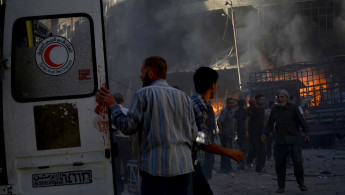British medics reportedly enter Islamic State group stronghold
A group of nine British medical students have travelled to Syria and are believed to be working in hospitals controlled by the Islamic State group.
3 min read
Syria's medical services have taken a battering in the four-year war [Anadolu]
A group of four young men and five women are understood to have entered into Islamic State-held Syrian territory, while many of their relatives wait on the border with Turkey, pleading for their return.
The group, all medical students, have Sudanese roots and had been studying in Khartoum before travelling to Turkey. It is understood they crossed into Syria more than a week ago.
The group, all medical students, have Sudanese roots and had been studying in Khartoum before travelling to Turkey. It is understood they crossed into Syria more than a week ago.
| The kids are sending messages to the families every day saying 'don’t worry about us, we are working, we are fine' - Mehmet Ali Ediboglu, local opposition politician |
"We all assume that they are in Tel Abyad now, which is under [IS] control," Turkish opposition politician Mehmet Ali Ediboglu told the UK's Observer newspaper, shortly after meeting the families.
"The conflict out there is fierce, so medical help must be needed... They have been cheated, brainwashed. That is what I, and their relatives, think."
The UK's Home Office said the medics would not automatically face prosecution under anti-terror laws if they tried to return to the UK, as long as they could prove they had not been fighting.
The students are all in their late teenage years and early twenties, and, while they kept their plans secret from their families, one of the younger members did send a smiling selfie to her sister before entering Syria.
The memembers of the group have been identified as; Hisham Mohammed Fadlallah, Tasneem Suleyman Huseyin, Ismail Hamadoun, Nada Sami Kader, Mohammed Osama Badri Mohammed, Rowan Kamal Zine El Abidine, Tamer Ahmed Ebu Sebah and Lena Maumoon Abdulqadir and Sami Ahmed Kadir.
It is possible the British students crossed into Syria with two Sudanese classmates, who held dual nationalities.
Parents' campaign
At least seven of the students' parents are on the Turkish side of the border and are receiving text messages from their children.
"The kids are sending messages to the families every day saying 'don't worry about us, we are working, we are fine'," said Ediboglu, who represents the area. "It shouldn't be hard for the Turkish National Intelligence Service to track their phones. But they are taking things slow. Unfortunately we haven't seen any support from our government yet."
He added that some of the families said they had originally sent their children to Sudan to experience a more Islamic culture and to stay in touch with their roots.
In a message to her sister, Lena Abdulqadir said she wanted to "volunteer to help wounded Syrian people", and there was no reason to suggest any of the medics have taken up arms - or intend to.
Lena's father, Maumoon, told Birgün newspaper: "She was living in a land [Sudan] which needs a lot of doctors everywhere. Why would she go all the way to Syria for volunteering?"
Their skills will be in high demand among the IS militants, who are currently engaged in heavy fighting and taking casualties in the province.
Many of the thousands of foreign fighters who travel to fight with IS enter through the porous border with Turkey - but after several high profile cases, the Turkish authorities and foreign intelligence agencies have stepped up efforts to stop young Europeans making it across.
Turkey's ministry for EU affairs says it has turned back 1,500 European citizens from crossing the border to join IS.
Much of the border is still remote and the father of one of the girls said he informed British police before heading off to find his daughter. He has also filed a case with Turkish police, insisting that the group could not have crossed the border unnoticed.




 Follow the Middle East's top stories in English at The New Arab on Google News
Follow the Middle East's top stories in English at The New Arab on Google News


![A group of Palestinians, foreign and Israeli activists gather to participated in an olive picking event on the land in the town of Battir, which is under threat of confiscation by Israel in Bethlehem, occupied West Bank on 8 November 2024. [Getty]](/sites/default/files/styles/image_330x185/public/2182930803.jpeg?h=199d8c1f&itok=__0LgGsa)